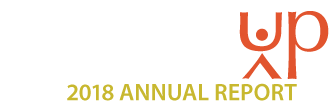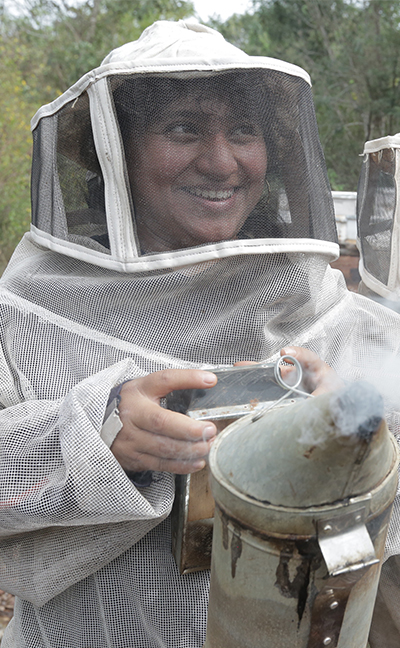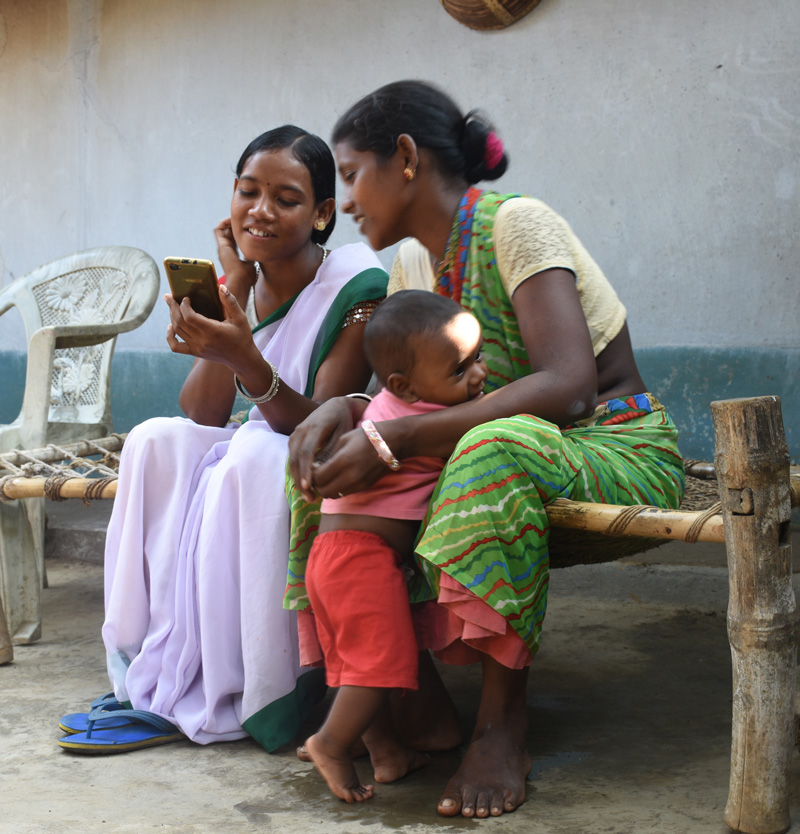160K+
participants in 2018,
more than double that of 2017
$6.6M
2018 operating income, a 42%
increase from 2017
countries where we work
47
partner organizations
4.5K
participant savings groups
100%
local leadership in field offices
Dear Friends,
2018 has been the most important year in Trickle Up’s 40-year history.
We served 160,127 people in 19 countries – more than twice the number we reached in 2017 and 13 times the level of just three years earlier. We began a major new program in Uganda and expanded our global partnerships with high-impact institutions including UNHCR/The UN Refugee Agency, the World Bank, India’s National Rural Livelihoods Mission, the US State Department, and the US Agency for International Development. We continued to innovate with new program methods and customized smartphone apps that will put the computing and communication power of the Internet into the hands of our participants. Our operating income for fiscal year 2018 was $6.6 million, a 42% increase from 2017.
Even as we have grown and evolved, we have stayed true to the principles that our founders Glen and Mildred Robbins Leet established in 1979: reaching the poorest and most vulnerable people, those often overlooked by governments and other poverty agencies; focusing on women as drivers of economic progress; and trusting that even those with few assets or little formal education can use Trickle Up’s catalytic potential to dramatically improve their families’ lives.
Overcoming multiple barriers of poverty and vulnerability
Extreme poverty is about more than a lack of money. People confronting extreme poverty face multiple barriers to progress: lack of access to markets, healthcare, nutrition, education, proper water and sanitation; discrimination based on gender, heritage, and disability; and instability due to conflict, climate change, and lack of economic opportunity. Within our broad mission to help people escape profound levels of poverty, we work to adapt our basic approach to the needs of diverse populations, including:
- Refugees and Displaced Persons: We continue our work addressing the global refugee crisis by developing new tools and manuals adapting Trickle Up’s approach for refugees and other displaced people. Our partnership with UNHCR/The UN Refugee Agency helped bring Trickle Up’s approach to 10 countries, including Argentina, Burkina Faso, Costa Rica, Ecuador, Egypt, Malawi, Mozambique, Sudan, Zambia, and Zimbabwe. With funding from the USAID Food for Peace program, we began work with our partners AVSI Foundation and IMPAQ to design a project in Uganda that will benefit 13,200 refugees and host community members in extreme poverty. And, with support from the US State Department, we are developing partnerships with large-scale global agencies that can reach many thousands of refugees.
- Young Women and Girls: Our partnership with MetLife Foundation in Mexico, Vietnam, and Bangladesh entered its second year and will ultimately empower 23,000 young women and girls to build sustainable livelihoods and improve their financial health and well-being. Results from the project could transform how financial services providers serve people in deep poverty worldwide. And, as part of our Jovenes Empoderadas project in Guatemala, we’re working to promote sustainable livelihoods and sexual and reproductive health among young women and girls so they are equipped to make smart choices and plan for the future.
- Indigenous People: Through our partnerships with MetLife Foundation in Mexico, the Vibrant Villages Foundation and UNFCU Foundation in Guatemala, plus the government of Paraguay, we reached 7,850 indigenous people in the Americas. We also expanded our work with two state branches of the world’s largest anti-poverty program, India’s National Rural Livelihoods Mission, to reach 4,324 members of particularly vulnerable tribal groups in the states of Jharkhand and Odisha.
- People with Disabilities: In northern Guatemala we continued Inclusive Ixcan, a project spanning 20 communities focused on promoting livelihoods and social inclusion of people with disabilities. The project builds upon previous Trickle Up projects with people with disabilities in Mexico, Guatemala, Nicaragua, and Mali. Research adapting our approach for people with disabilities was published this year by Practical Action, a resource for peers and policymakers, to share our experience ensuring people with disabilities are effectively included in anti-poverty programs.
- Children: In Burkina Faso, West Africa, we concluded a project aimed at learning how Trickle Up’s program can provide a platform to advance the well-being of children. Results from the evaluation have been published in four academic journals.
Deploying mobile technology to fight poverty
In 2018 we concluded our M-POWERED project in India testing the effectiveness of delivering Trickle Up’s skill-building and coaching components through a mobile app called POP (Package of Practices). Designed for low-literacy populations, the POP app is already helping 1,808 Trickle Up participants in Jharkhand and Odisha learn how to grow crops, connect with coaches remotely for advice, and plan for the future. In the coming months we will publish a final evaluation of the project with Tata Communications and KPMG revealing important lessons for improving and scaling the application to benefit tens of thousands more people.
We continued to build out cutting-edge digital systems for monitoring and reporting the progress of our projects that will allow Trickle Up, our partners, and coaches to be more insightful, responsive, and adaptable to participants’ needs and events as they happen on the ground.
Sharing our expertise to inform government policy
We have developed relationships with policymakers at every level—municipal, state, national and global—to help them optimize their existing poverty programs and integrate Trickle Up’s program approach. We’re able to impact far more lives when we work with governments and international agencies. Our current partners include UNHCR; the National Rural Livelihoods Mission in India; the Technical Secretariat of Economic and Social Development Planning of Paraguay; municipalities across Guatemala; the national governments of Senegal, Mauritania, Burkina Faso, Chad and Niger, and the World Bank. To share what we’ve learned with government policymakers, we have hosted two Round Table events in Mexico and India, engaging government officials from Mexico, Paraguay, India, Vietnam, and Bangladesh.
Learning from women like Wilma Santiago
Even though we’ve helped many thousands of families in our four decades, we never want to be frozen in time. We are always learning, always looking for ways to adapt our approach to specific geographic and population contexts, always seeking to improve our effectiveness and efficiency. We learn from our partners and peers, our global staff of 60 professionals (two thirds located in our regional offices in Burkina Faso, Guatemala and India), and from the women who participate in Trickle Up.
One of the many stories we could share is that of Wilma Santiago from Yucatán, Mexico.
When we last visited Wilma, she was pumping white smoke through the nose of a metal can into one of her twelve beehives. Her infectious smile was still visible through the protective mesh of her beekeeper’s hat. “I have learned so much about beekeeping,” she told us, “When to feed them, how to keep away the ants that try to eat the hives.” Then, plunging a bare hand into the white box of bees, she plucked a wooden pane of comb from the hive and said, “I have been stung many times but I don’t mind.” Learning to handle and nurture bees, package and market their honey, and save and plan for the future are all skills Wilma has learned with Trickle Up. The income Wilma now earns from selling honey puts food on the table, buys medicine for her son, and sends both of her children to school. “This is such a big opportunity,” she told us, “I will not waste it.”
As we enter our 40th year, we celebrate the millions of women like Wilma who have built brighter futures and overcome extreme poverty with Trickle Up. Our progress continues to be fueled by our dedicated staff and board, our partners around the world, the donors who enable our work, and all the women who use Trickle Up as the catalyst for building new and better futures for their families. As Wilma taught us: This is such a big opportunity. We will not waste it.
Sincerely,
Bill Abrams, President
Penny Foley, Board Chair
Dear Friends,
2018 has been the most important year in Trickle Up’s 40-year history.
160.1K
participants in 2018, more than double that of 2017
We served 160,127 people in 19 countries – more than twice the number we reached in 2017 and 13 times the level of just three years earlier. We began a major new program in Uganda and expanded our global partnerships with high-impact institutions including UNHCR/The UN Refugee Agency, the World Bank, India’s National Rural Livelihoods Mission, the US State Department, and the US Agency for International Development. We continued to innovate with new program methods and customized smartphone apps that will put the computing and communication power of the Internet into the hands of our participants. Our income for our fiscal 2018 was $6.7 million, a 42% increase from 2017.
$6.7M
2018 income, a 42% increase from 2017
Even as we have grown and evolved, we have stayed true to the principles that our founders Glen and Mildred Robbins Leet established in 1979: reaching the poorest and most vulnerable people, those often overlooked by governments and other poverty agencies; focusing on women as drivers of economic progress; and trusting that even those with few assets or little formal education can use Trickle Up’s catalytic potential to dramatically improve their families’ lives.
Overcoming multiple barriers of poverty and vulnerability
Extreme poverty is about more than a lack of money. People confronting extreme poverty face multiple barriers to progress: lack of access to markets, healthcare, nutrition, education, proper water and sanitation; discrimination based on gender, heritage, and disability; and instability due to conflict, climate change, and lack of economic opportunity. Within our broad mission to help people escape profound levels of poverty, we work to adapt our basic approach to the needs of diverse populations, including:
- Refugees and Displaced Persons: We continue our work addressing the global refugee crisis by developing new tools and manuals adapting Trickle Up’s approach for refugees and other displaced people. Our partnership with UNHCR/The UN Refugee Agency helped bring Trickle Up’s approach to 10 countries, including Argentina, Burkina Faso, Costa Rica, Ecuador, Egypt, Malawi, Mozambique, Sudan, Zambia, and Zimbabwe. With funding from the USAID Food for Peace program, we began work with our partners AVSI Foundation and IMPAQ to design a project in Uganda that will benefit 13,200 refugees and host community members in extreme poverty. And, with support from the US State Department, we are developing partnerships with large-scale global agencies that can reach many thousands of refugees.
- Young Women and Girls: Our partnership with MetLife Foundation in Mexico, Vietnam, and Bangladesh entered its second year and will ultimately empower 23,000 young women and girls to build sustainable livelihoods and improve their financial health and well-being. Results from the project could transform how financial services providers serve people in deep poverty worldwide. And, as part of our Jovenes Empoderadas project in Guatemala, we’re working to promote sustainable livelihoods and sexual and reproductive health among young women and girls so they are equipped to make smart choices and plan for the future.
- Indigenous People: Through our partnerships with MetLife Foundation in Mexico, the Vibrant Villages Foundation and UNFCU Foundation in Guatemala, plus the government of Paraguay, we reached 7,850 indigenous people in the Americas. We also expanded our work with two state branches of the world’s largest anti-poverty program, India’s National Rural Livelihoods Mission, to reach 4,324 members of particularly vulnerable tribal groups in the states of Jharkhand and Odisha.
4,500+
participant savings groups
- People with Disabilities: In northern Guatemala we continued Inclusive Ixcan, a project spanning 20 communities focused on promoting livelihoods and social inclusion of people with disabilities. The project builds upon previous Trickle Up projects with people with disabilities in Mexico, Guatemala, Nicaragua, and Mali. Research adapting our approach for people with disabilities was published this year by Practical Action, a resource for peers and policymakers, to share our experience ensuring people with disabilities are effectively included in anti-poverty programs.
- Children: In Burkina Faso, West Africa, we concluded a project aimed at learning how Trickle Up’s program can provide a platform to advance the well-being of children. Results from the evaluation have been published in four academic journals.
100%
local leadership in the field
Deploying mobile technology to fight poverty
In 2018 we concluded our M-POWERED project in India testing the effectiveness of delivering Trickle Up’s skill-building and coaching components through a mobile app called POP (Package of Practices). Designed for low-literacy populations, the POP app is already helping 1,808 Trickle Up participants in Jharkhand and Odisha learn how to grow crops, connect with coaches remotely for advice, and plan for the future. In the coming months we will publish a final evaluation of the project with Tata Communications and KPMG revealing important lessons for improving and scaling the application to benefit tens of thousands more people.
19
countries where we work
We continued to build out cutting-edge digital systems for monitoring and reporting the progress of our projects that will allow Trickle Up, our partners, and coaches to be more insightful, responsive, and adaptable to participants’ needs and events as they happen on the ground.
47
partner organizations
Sharing our expertise to inform government policy
We have developed relationships with policymakers at every level—municipal, state, national and global—to help them optimize their existing poverty programs and integrate Trickle Up’s program approach. We’re able to impact far more lives when we work with governments and international agencies. Our current partners include UNHCR; the National Rural Livelihoods Mission in India; the Technical Secretariat of Economic and Social Development Planning of Paraguay; municipalities across Guatemala; the national governments of Senegal, Mauritania, Burkina Faso, Chad and Niger, and the World Bank. To share what we’ve learned with government policymakers, we have hosted two Round Table events in Mexico and India, engaging government officials from Mexico, Paraguay, India, Vietnam, and Bangladesh.
Learning from women like Wilma Santiago
Even though we’ve helped many thousands of families in our four decades, we never want to be frozen in time. We are always learning, always looking for ways to adapt our approach to specific geographic and population contexts, always seeking to improve our effectiveness and efficiency. We learn from our partners and peers, our global staff of 60 professionals (two thirds located in our regional offices in Burkina Faso, Guatemala and India), and from the women who participate in Trickle Up.
One of the many stories we could share is that of Wilma Santiago from Yucatán, Mexico.
When we last visited Wilma, she was pumping white smoke through the nose of a metal can into one of her twelve beehives. Her infectious smile was still visible through the protective mesh of her beekeeper’s hat. “I have learned so much about beekeeping,” she told us, “When to feed them, how to keep away the ants that try to eat the hives.” Then, plunging a bare hand into the white box of bees, she plucked a wooden pane of comb from the hive and said, “I have been stung many times but I don’t mind.” Learning to handle and nurture bees, package and market their honey, and save and plan for the future are all skills Wilma has learned with Trickle Up. The income Wilma now earns from selling honey puts food on the table, buys medicine for her son, and sends both of her children to school. “This is such a big opportunity,” she told us, “I will not waste it.”
As we enter our 40th year, we celebrate the millions of women like Wilma who have built brighter futures and overcome extreme poverty with Trickle Up. Our progress continues to be fueled by our dedicated staff and board, our partners around the world, the donors who enable our work, and all the women who use Trickle Up as the catalyst for building new and better futures for their families. As Wilma taught us: This is such a big opportunity. We will not waste it.
Sincerely,
Bill Abrams, President
Penny Foley, Board Chair





